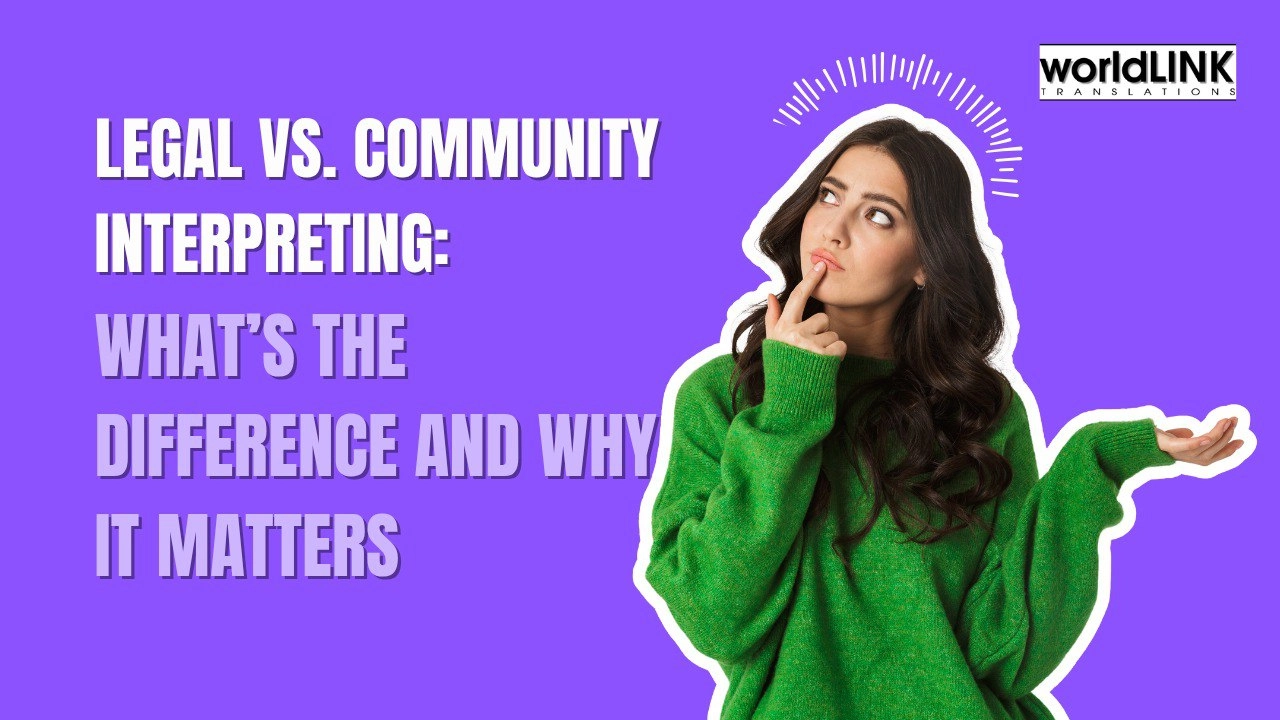Legal interpreting demands precise, certified language accuracy for courtroom or legal settings, while community interpreting focuses on everyday services like healthcare, housing, or education. Each has different standards, qualifications, and consequences for miscommunication.
Language access is essential, especially in diverse communities. However, not all interpreters perform the same role. There are major differences between legal interpreting vs. community interpreting, and understanding them is key to providing the right support in high-stakes situations.
In this blog, we’ll break down the differences, qualifications, and real-world implications of choosing the right type of interpreter.
What Is Legal Interpreting?
Legal interpreting involves oral interpretation in settings like:
- Courtrooms
- Immigration hearings
- Police interviews
- Depositions
- Legal consultations
Certified legal interpreters are trained to:
- Accurately interpret technical legal language
- Maintain neutrality
- Follow court protocol
A legal interpreter must not paraphrase, omit, or embellish. Their job is to convey exact meaning, including tone, hesitation, and legal terminology. One misinterpreted word could impact someone’s freedom, status, or case outcome.
Key Traits of Legal Interpreting:
- Court-certified or registered
- Bound by strict confidentiality and ethics
- Required for due process and compliance
- Often under scrutiny in adversarial settings
What Is Community Interpreting?
Community interpreting happens in everyday service settings, such as:
- Hospitals and clinics
- Schools and universities
- Social services
- Housing and employment agencies
The goal is to bridge language gaps for individuals navigating systems they depend on.
Community interpreters must still be highly accurate, but the tone may be more conversational and empathetic. They often clarify or explain cultural nuances that help communication flow.
Key Traits of Community Interpreting:
- Flexible, context-driven
- Focused on access and understanding
- May involve cultural brokering
- Training and certification can vary by setting
Interpreter Specialization: Why It Matters
When someone searches for an “interpreter,” they might not realize that specialization is critical. Assigning the wrong type of interpreter can lead to:
- Miscommunication in legal matters
- Violations of client rights
- Poor healthcare outcomes
- Education gaps for students
For instance, a community interpreter in a courtroom might not be familiar with due process terminology. A legal interpreter in a mental health session might struggle with the nuanced, emotional needs of the patient.
Interpreter Training Requirements
Legal Interpreters:
- Must pass certification exams (state/federal)
- Often complete legal terminology courses
- Required to follow court interpreting standards
- May have ongoing CEUs (continuing education units)
Community Interpreters:
- Training in medical, education, or social service language
- May be certified through community interpreter programs
- Learn basic interpreting ethics and standards
- Often bilingual community members with additional training
When Accuracy Is Critical: The Legal Risk Factor
Mistakes in legal interpreting can invalidate trials, delay hearings, or result in wrongful outcomes.
- One misunderstood phrase in an immigration interview can lead to deportation.
- In a courtroom, a misused legal term can sway a jury.
In contrast, community interpreting mistakes may delay services or create confusion but rarely have legal consequences. Still, both roles impact people’s lives deeply.
Real World Example: Choosing the Right Interpreter
Imagine a woman seeking help at a domestic violence shelter. If she also has an upcoming custody hearing, she may need two different interpreters:
- A trained community interpreter for the shelter staff
- A certified legal interpreter for the family court proceedings
Knowing the difference ensures she gets the best possible support at both stages.
Final Thoughts: Use the Right Interpreter for the Right Setting
In the world of interpreting, context is everything. Legal and community interpreting serve different purposes, require different qualifications, and come with different consequences when things go wrong.
If you’re a public service agency, healthcare provider, or legal professional, choosing the right interpreter is not optional, it’s your responsibility.
Need help matching interpreter expertise to your situation? Visit World-Link Inc. for certified, professional language services tailored to legal, healthcare, and community settings.

